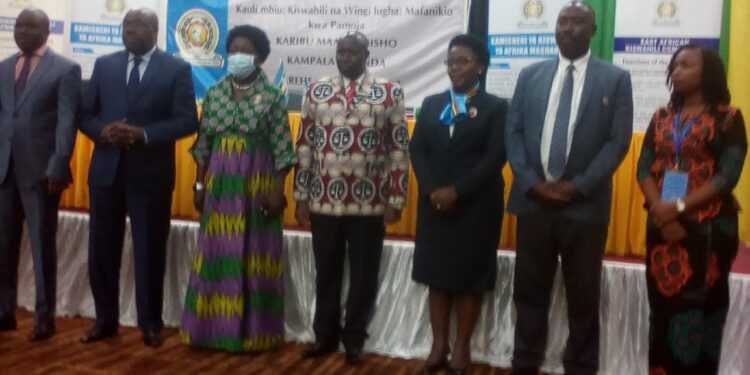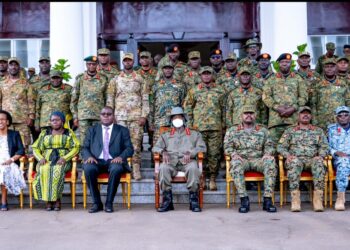By Ambrose Gahene
Language experts have laid blame on Africa’s colonial masters for curtailing and muzzling the spread of Kiswahili, one of the oldest spoken languages in the world, from spreading across the African continent and beyond. The Kiswahili Language academic gurus say it’s high time Africa and in particular; East Africa community (EAC) member states pulled up their socks in as far as promoting Kiswahili language is concerned, for prosperity and accelerating economic development in the EAC region.
Fikeni EMK Senkoro,Dar- es- Salaam University Language Professor, while giving a keynote address at the opening day of World Kiswahili Day in Kampala’s Hotel Africana, said colonialism is responsible for crippling Kiswahili language in Africa, through promotion of foreign languages and dividing Africans along Francophone and Anglophone artificial differences.
Prof. Senkoro, the author of 58 books and journal articles as well as 64 papers retrievable from published conference and symposium proceedings, said had it not been for colonialism interference, Kiswahili would be number one spoken language on the globe.
“Kiswahili is rich in both language and culture, because it is derived from different ethnic tribes of Africa which is why African scholars from the EAC bloc should endeavor to teach students using Kiswahili for both Science and Arts subjects, ”he said.
Prof. Senkoro also blamed African agents of colonialism, especially school Head teachers and parents, from crippling Kiswahili through encouraging school going pupils and students to speak in English or French while at school, saying students found speaking their local dialects were and continue to be subjected to punishments to date.
He hailed the late Tanzanian President Julius Nyerere, for promoting Kiswahili in the EAC, which has united Tanzanians since Independence to date, but insisted that more effort is needed for the present generation in the EAC to continue from where Mwalimu Nyerere reached.
The guest of Honor, Uganda’s First Deputy Prime Minister and Minister for East African Community Affairs, Rebecca Kadaga reiterated the need for Ugandan legislators to embrace Kiswahili language, saying it’s the only way Uganda can be on the same economic growth track with other EAC States. She said the Ugandan Government is committed to embrace Kiswahili language by making it a compulsory and examinable subject in Schools.
The Second World Kiswahili Day celebrations were organized by the EAC Secretariat and the Government of Uganda. They brought together policymakers, academicians, and language experts from across the region to discuss the role of Kiswahili in promoting regional integration and sustainable development.
The theme of this year’s World Kiswahili Day; “Kiswahili and Multilingualism: Achieving more Together” event reflects the growing importance of Kiswahili as a regional and international language.
Kiswahili is increasingly being used in business, education, and culture in East Africa and beyond. It is also becoming a more popular language for learning, as people from all over the world are recognizing its value as a lingua franca.Caroline Asiimwe, the Executive Secretary for the East Africa Kiswahili Commission, said World Kiswahili Language Day is an important opportunity to promote the use of Kiswahili in Uganda and the East African Community, to discuss the role of Kiswahili in facilitating trade and regional integration.
The event, which will be concluded on Friday, 7 July 2023, featured a variety of activities, including panel discussions, exhibitions, and cultural performances.
Do you have a story in your community or an opinion to share with us: Email us at editorial@watchdoguganda.com











